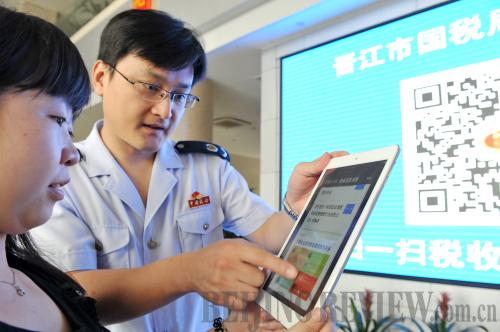
WETAX: Xu Lihui (right), an officer in Jinjiang's State Taxation Bureau helps a company employee access the bureau's public WeChat account, on June 7, 2014 (XU SHANCHUAN)
Marketing platform
For businesses, WeChat is a new marketing platform. The service provides accounts that businesses can use to broadcast messages to users and engage their fans or followers. Once a user responds, the business can interact with him or her.
Businesses usually attract users by issuing e-coupons and other promotional offers. They can also engage customers by featuring their brands' QR codes in sales materials, and enticing users to scan the codes with discounts, lucky draws or souvenirs.
Distributing Lucky Money to users during the Chinese New Year is a typical marketing strategy for businesses to interact with consumers.
Issuing e-coupons is also a popular way for businesses to engage customers. These e-coupons are particularly viable for the Online to Offline (O2O) sales model. For instance, with the e-coupons they have received online, users can enjoy services in eateries, gyms, cinemas and beauty salons.
After receiving coupons issued by businesses through WeChat, when a user contacts businesses' public accounts, his or her behavior will be tagged so that companies can learn more about users and target them more precisely, said Xue Wenyi, Chief Operating Officer of Adsit Media Technology Co. Ltd.
Such information makes marketing more flexible. "When a user has browsed your online store for half a day without placing an order, that is probably out of concern about price. At this moment, a coupon can pop out of the system based on prior understanding of the user. Won't that convert the user into a buyer?" said Xue.
She gave other marketing examples. "You can have a salesperson hold Bluetooth device and ask users to shake their smartphones, then the coupons of your store can reach these users," she said. Staff members can also distribute coupons in their WeChat Moments, which represents free advertisement, she added.
On August 28, 2014, Tencent released WeChat smart-living solutions for industries in a bid to help traditional industries to transfer their business models onto the WeChat platform.
So far, Tencent's WeChat team has developed standard solutions in more than 10 fields such as healthcare, catering, hotel, transportation, post service, ticket service and scenic spots. WeChat has brought revolutionary changes to many companies.
For instance, a patient and his or her family members can make an appointment for a hospital visit, receive prescriptions and pay medical bills through WeChat. Medical examination results can also be delivered through WeChat.
In Tencent CEO Pony Ma's words, the purpose of Tencent, and WeChat as well, is to connect everything.
"WeChat has become a tool extending human functions, a piece of efficiency-boosting software and an entrance to smart living," said a core member of Tencent's WeChat team, WeChat will meet users' needs and its future will no doubt be full of pleasant surprises and high expectations.
















































